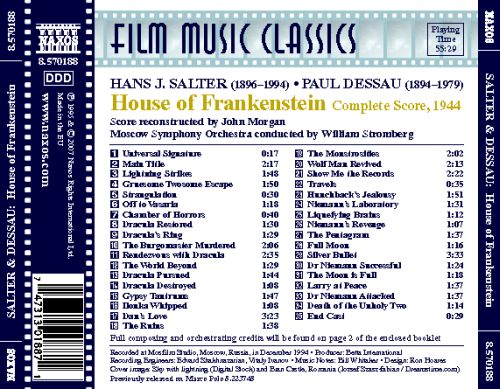1
/
of
2
Salter: House of Frankenstein
Salter: House of Frankenstein
Regular price
$19.99 USD
Regular price
$19.99 USD
Sale price
$19.99 USD
Unit price
/
per
Shipping calculated at checkout.
Couldn't load pickup availability
Production values high, recordings full and spacious, performances totally committed.
Just when you thought it was safe to leave the shelter of the world behind the sofa here come not one, not two, but three monsters – Dracula, The Wolf Man and the Frankenstein Monster! And with them comes the most preposterous plot of all! Mad scientist Boris Karloff escapes from prison thanks to a thunderstorm; with a hunchback assistant he takes the persona of the owner of a travelling chamber of horrors. Within days he has got his hands on the three monsters already named, finding the Frankenstein Monster and the Wolf Man encased in ice in a cave, and he punctuates his desire for revenge with experiments in brain transplants! In the end, everybody dies.
Whether or not the plot is silly, to say the least, the music is superb!
Hans J Salter was another refugee from Nazi Germany, a man who studied with Alban Berg and Franz Schreker, who made his career in Hollywood. His collaborator, Paul Dessau, had arrived in America in 1939 after a career in Europe as both composer and conductor. He was made more politically aware through wartime collaboration with Brecht and joined the American Communist Party in 1946, returning to East Berlin two years later. His collaboration with Brecht continued, and after the writer’s death took to writing using Schoenberg’s twelve note technique and supporting the growing West European avant-garde.
This disk gives us the complete score for the film – 55 minutes of the most eerie and atmospheric music, with the most evocative titles – Rendezvous with Dracula, Death of the Unholy Two and Liquefying Brains. What a score it is and what marvellous work John Morgan has done in his reconstruction from a three line piano score – Universal having destroyed all their old horror film scores. The orchestration is fully 1940s horror and the music sounds incredibly modern – so much so that when the Moscow musicians were recording the score they wondered if it was from a modern film. This is music for film which was truly ahead of its time.
Having already written about seven of these disks in the Naxos Film Music Classics series there is little new I can say. The production values are high, the recordings full and spacious, the performances totally committed, the booklet helpful and detailed and the standard of scholarship without peer.
How about giving us some David Raksin? I’d put The Bad and the Beautiful (1952), The Big Combo (1955) and Al Capone (1959) on the list for a start. Am I being greedy? Of course I am, but Naxos cannot, after what we’ve already heard, stop giving us such quality recordings.
-- Bob Briggs, MusicWeb International
Just when you thought it was safe to leave the shelter of the world behind the sofa here come not one, not two, but three monsters – Dracula, The Wolf Man and the Frankenstein Monster! And with them comes the most preposterous plot of all! Mad scientist Boris Karloff escapes from prison thanks to a thunderstorm; with a hunchback assistant he takes the persona of the owner of a travelling chamber of horrors. Within days he has got his hands on the three monsters already named, finding the Frankenstein Monster and the Wolf Man encased in ice in a cave, and he punctuates his desire for revenge with experiments in brain transplants! In the end, everybody dies.
Whether or not the plot is silly, to say the least, the music is superb!
Hans J Salter was another refugee from Nazi Germany, a man who studied with Alban Berg and Franz Schreker, who made his career in Hollywood. His collaborator, Paul Dessau, had arrived in America in 1939 after a career in Europe as both composer and conductor. He was made more politically aware through wartime collaboration with Brecht and joined the American Communist Party in 1946, returning to East Berlin two years later. His collaboration with Brecht continued, and after the writer’s death took to writing using Schoenberg’s twelve note technique and supporting the growing West European avant-garde.
This disk gives us the complete score for the film – 55 minutes of the most eerie and atmospheric music, with the most evocative titles – Rendezvous with Dracula, Death of the Unholy Two and Liquefying Brains. What a score it is and what marvellous work John Morgan has done in his reconstruction from a three line piano score – Universal having destroyed all their old horror film scores. The orchestration is fully 1940s horror and the music sounds incredibly modern – so much so that when the Moscow musicians were recording the score they wondered if it was from a modern film. This is music for film which was truly ahead of its time.
Having already written about seven of these disks in the Naxos Film Music Classics series there is little new I can say. The production values are high, the recordings full and spacious, the performances totally committed, the booklet helpful and detailed and the standard of scholarship without peer.
How about giving us some David Raksin? I’d put The Bad and the Beautiful (1952), The Big Combo (1955) and Al Capone (1959) on the list for a start. Am I being greedy? Of course I am, but Naxos cannot, after what we’ve already heard, stop giving us such quality recordings.
-- Bob Briggs, MusicWeb International
Share


Product Description:
-
Release Date: September 25, 2007
-
UPC: 747313018871
-
Catalog Number: 8570188
-
Label: Naxos
-
Number of Discs: 1
-
Composer: SALTER, HANS J.
-
Orchestra/Ensemble: Moscow Symphony Orchestra
-
Performer: William Stromberg


